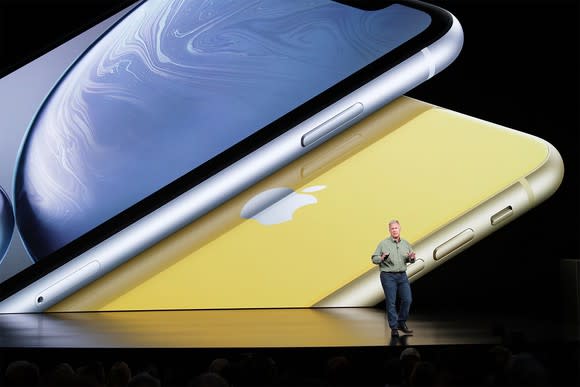What This Apple Supplier Told Us About the 2019 iPhones
On Sept. 12, Apple (NASDAQ: AAPL) launched three new iPhones. At the high-end of its product stack, Apple introduced the iPhone XS -- the direct successor to last year's iPhone X -- and the iPhone XS Max, a variant of the iPhone XS with an even bigger screen. For more price-sensitive customers, Apple offered a product called the iPhone XR, which incorporates many of the new technologies found in the iPhone XS/XS Max, but uses cheaper components in some cases to reduce the cost structure of the device.
One way Apple seemingly chose to save money with the iPhone XR relative to the higher-end iPhone XS models is in the cellular subsystem. Apple says that the iPhone XS/XS Max support "gigabit-class LTE with 4x4 MIMO and [licensed assisted access]." The iPhone XR, on the other hand, simply supports "LTE Advanced" -- just as Apple's 2017 flagship smartphones do.

Image source: Apple.
Apple's choice not to endow the iPhone XR with the same cellular capabilities of the iPhone XS and iPhone XS Max have led longtime Apple chip supplier Broadcom (NASDAQ: AVGO) to admit that it lost some of the business in this year's iPhone lineup.
"Nonetheless, from time-to-time, not that often, but time-to-time, the same technology platform used by our customer may expand beyond one generation," Broadcom CEO Hock Tan explained on the company's Sept. 6 earnings conference call. "And when this happens, it does create an opportunity for a customer to temporarily use lower performance alternatives in selected SKUs."
Tan did say, though, that "every indication we have is that the cadence of annual platform upgrades will resume in the upcoming 2019 smartphone generation."
This seems to tell us, then, that Apple's planning a wireless technology upgrade for the next iteration of the iPhone XR.
Apple's straightforward iPhone XR upgrade path
Apple clearly had to do a significant amount of engineering work to get the iPhone XR ready to go for the current product cycle. Relative to its predecessors -- iPhone 8 and iPhone 8 Plus -- it sports a new casing design and a new display in addition to upgraded internals. The next iteration of the iPhone XR should be a more straightforward proposition -- I expect Apple to keep the same basic design but deliver internal specification updates.
One of those updates, if Broadcom's take on the situation is right, should be a move to a more advanced cellular subsystem.
What isn't totally clear, though, is whether Apple will continue to differentiate the successors to the iPhone XS and iPhone XS Plus from the iPhone XR through wireless capabilities or if it'll endow them all with the same capabilities. Indeed, one reason Tan's comments could indicate the latter is that if Apple were to simply give the next iPhone XR the same cellular capabilities as this year's iPhone XS and iPhone XS Max, then Apple would, in effect, be reusing one of the platforms that it used in the current product cycle.
I still expect Apple to continue to significantly differentiate the iPhone XS/XS Max successors from the iPhone XR successor, but cellular capabilities might not be one of the ways it does that next year.
More From The Motley Fool
Ashraf Eassa has no position in any of the stocks mentioned. The Motley Fool owns shares of and recommends Apple. The Motley Fool has the following options: long January 2020 $150 calls on Apple and short January 2020 $155 calls on Apple. The Motley Fool recommends Broadcom Ltd. The Motley Fool has a disclosure policy.

 Yahoo Finance
Yahoo Finance 